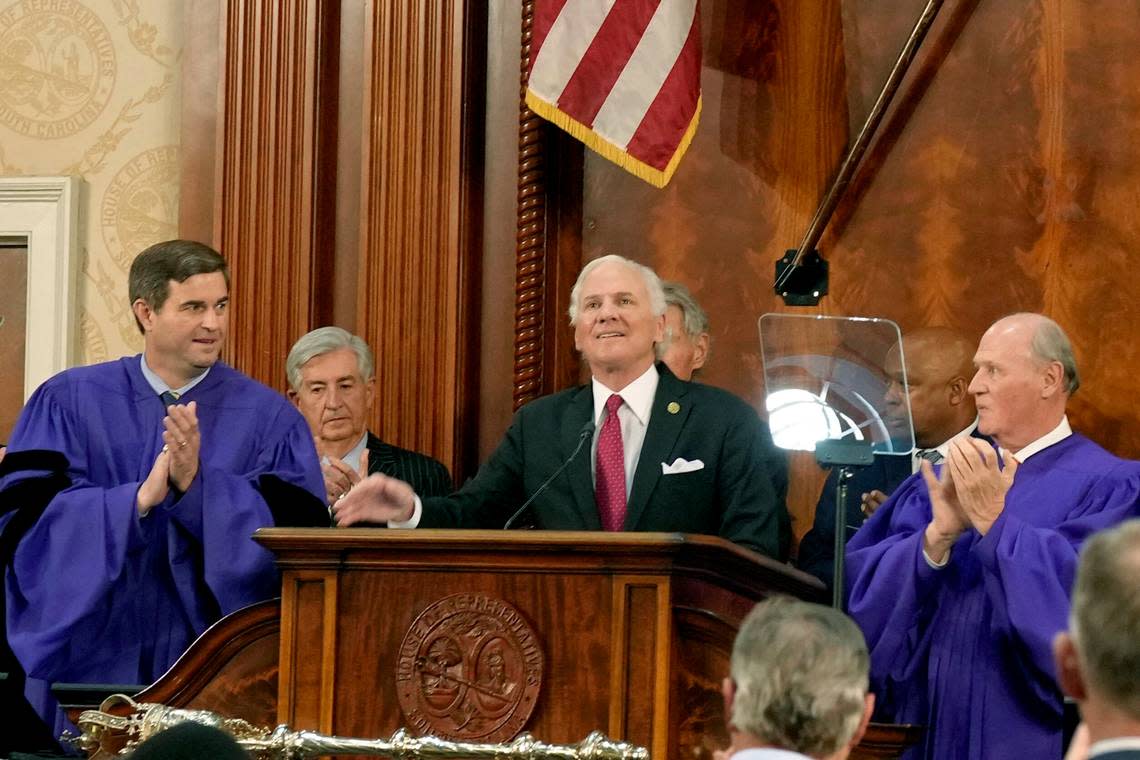McMaster targets courts after abortion ruling, says he wants say in SC judge picks
Gov. Henry McMaster says he no longer wants lawmakers to have all the say over who can be a judge in South Carolina.
In his State of the State address, an annual speech outlining the governor’s priorities, McMaster told lawmakers Wednesday he wants a role in making judicial appointments, with Senate approval.
The practice works on the federal level, McMaster told lawmakers, a similar sentiment he shared in his inaugural address when he called for more “transparency” in the way judicial candidates in the state are selected.
“Gubernatorial appointment of all judges, with the advice and consent of the state Senate, requires no ‘reinvention of the wheel,’ will inspire the confidence of our people, and will encourage more excellent attorneys to seek public service,” McMaster said.
McMaster and State House Republicans have targeted the courts and judges in response to the S.C. Supreme Court’s 3-2 decision that struck down the state’s six-week abortion ban.
Earlier this month, the state’s high court ruled the ban violated a state constitutional right to privacy. The law, passed in 2021 but temporarily blocked for months, took effect shortly after the U.S. Supreme Court’s Dobbs decision that struck down Roe v. Wade.
McMaster said Wednesday he plans with other state officials to petition the state Supreme Court for a rehearing next week.
“When I signed the ‘Heartbeat Act’ into law, I was confident that it was constitutional. I still am,” McMaster said in his sixth State of the State address, a speech more than 6,000 words long. “I remain optimistic that we will prevail in our historic fight to protect and defend the right to, and the sanctity of, life.”
“Respectfully, the court’s (abortion) decision is at odds with the law and the facts, and the lead opinion’s results-oriented reasoning threatens to disrupt our constitutional separation of powers,” McMaster said.
In the Democratic response to McMaster’s address, state Sen. Ronnie Sabb of Williamsburg called on the state to hold a statewide referendum on abortion access. Public votes to deny rights to abortion in access in Kansas and Kentucky both failed last year.
“Our state Supreme Court has acknowledged that a woman has a constitutional right to privacy and has struck down the repeated attacks from Republicans seeking to limit a woman’s access to health care during pregnancy,” Sabb said. “Women have a fundamental right to control their own bodies.”
State lawmakers already are considering another attempt to ban abortions from the point of conception, an effort that failed in the fall. A House panel Thursday pushed forward the legislation, which includes exceptions for rape, incest, fatal fetal anomalies or the life of the mother, to the full Judiciary Committee.
A recent poll by the South Carolina Policy Council found 52% of likely South Carolina voters support access to abortion under certain circumstances, and 34% say it should be legal under any circumstances.
Only 14% of likely voters said abortion should be illegal in all circumstances.
In response to the state Supreme Court’s ruling, lawmakers have called for a reexamination of the high court and the judicial vetting process — which they oversee. South Carolina is one of only two states where lawmakers, not the voters, elect judges.
Next month, the Legislature will decide on Justice Kaye Hearn’s replacement to the state Supreme Court. Of the three original candidates, two women withdrew their candidacy, leaving one man, Judge Gary Hill, the likely pick. It will be the first time in more than three decades the state Supreme Court won’t have a woman on the bench.
State Rep. John McCravy, R-Greenwood, who was critical of the state Supreme Court’s decision, said Wednesday that changing the judicial selection process will require a state constitutional amendment.
“Our Constitution requires the (Judicial Merit Selection Commission) to select judges,” he said. “However, I think the JMSC definitely needs to be reformed. We need to make sure that we have a way to elect judges that does not involve legislators, in my opinion.”
House Minority Leader Rep. Todd Rutherford, who sits on the legislative screening commission, said the current system of picking judges needs tweaks rather than an overhaul, such as allowing for more than three people to be placed in nomination in front of lawmakers for judicial election rather than it being capped.
“The inclusion of more people in the process is better for transparency rather than giving it to one person,” Rutherford, D-Richland, said.
Rutherford said McMaster just wants to centralize power when it comes to judges to the governor’s office.
“What he wants to go to is a system where people donate money to the governor, and by virtue of doing that they get elected to a judgeship,” Rutherford said. “Absolutely absurd and hasn’t worked with anything else. We continue to have the best system to elect judges. And Virginia is right in line with that.”
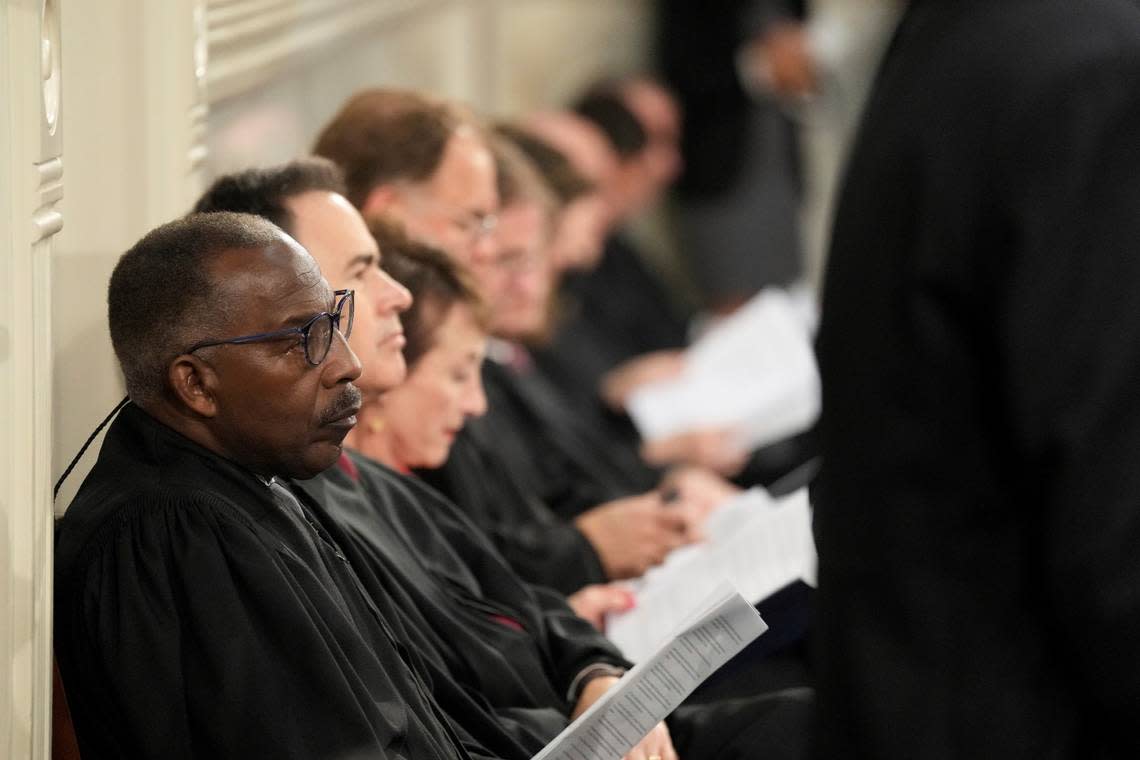
In a similar vein, McMaster used his State of the State speech to criticize lawyer-legislators who sue state agencies and other elected officials.
A few years ago, state Sen. Dick Harpootlian, a Richland County Democrat and an attorney, sued the state Department of Commerce to demand information about incentives the agency offers to companies locating in the state.
“I suggest that it’s time for members of the General Assembly who are attorneys to stop suing the bodies in which they serve, stop suing state agencies in plaintiff actions, and stop suing elected officials,” McMaster said. “This is absurd. It diminishes the public’s confidence not only in the lawyer legislators but the rest of state government as well.”
Rutherford, critical of McMaster’s stance, gave a sly smile in response.
“If state agencies are doing wrong and if members of the executive branch are doing wrong, they need to get sued. That’s a part of the process,” Rutherford said. “He knows that as a lawyer, I was disappointed to hear him mention that lawyer legislators should not correct the wrongs of state government.”
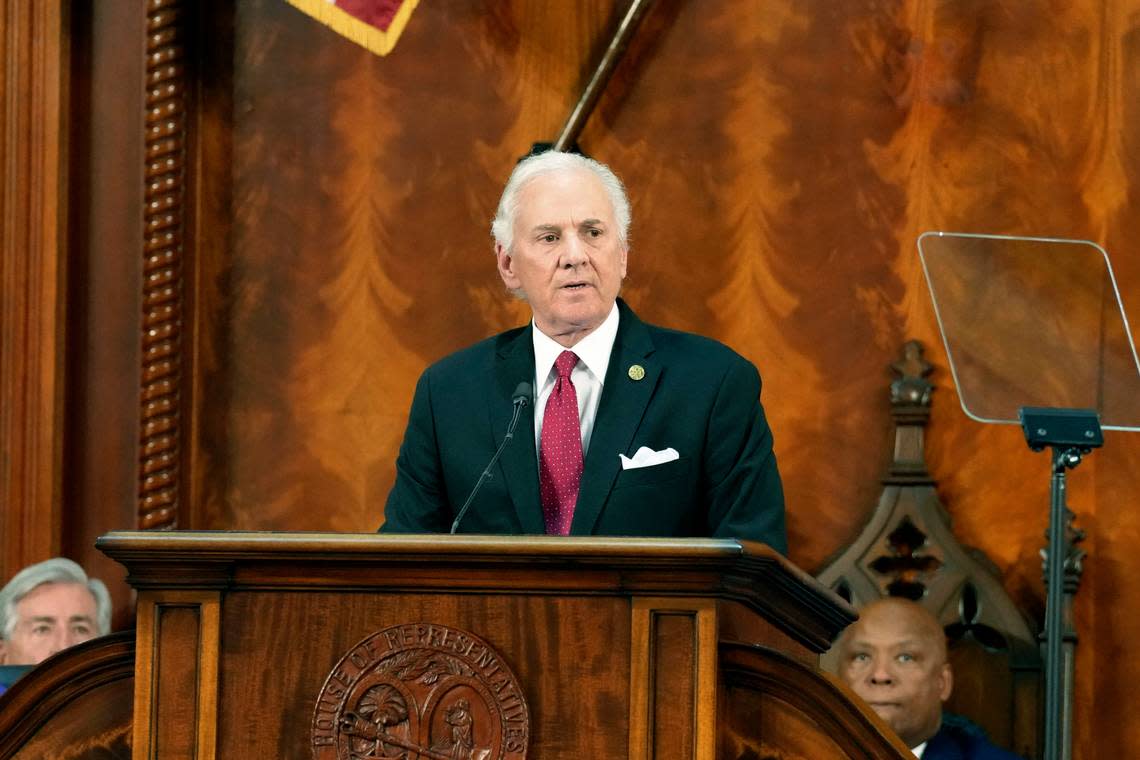
McMaster pushes for more economic investment, again
McMaster’s Wednesday speech hit points similar to his inaugural address earlier this month.
McMaster touted the more than $10 billion of economic development investment announced last year, largely due to the growing electric car industry as automakers around the country shift to making more electric vehicles.
“State government is in superior fiscal shape,” McMaster said Wednesday.
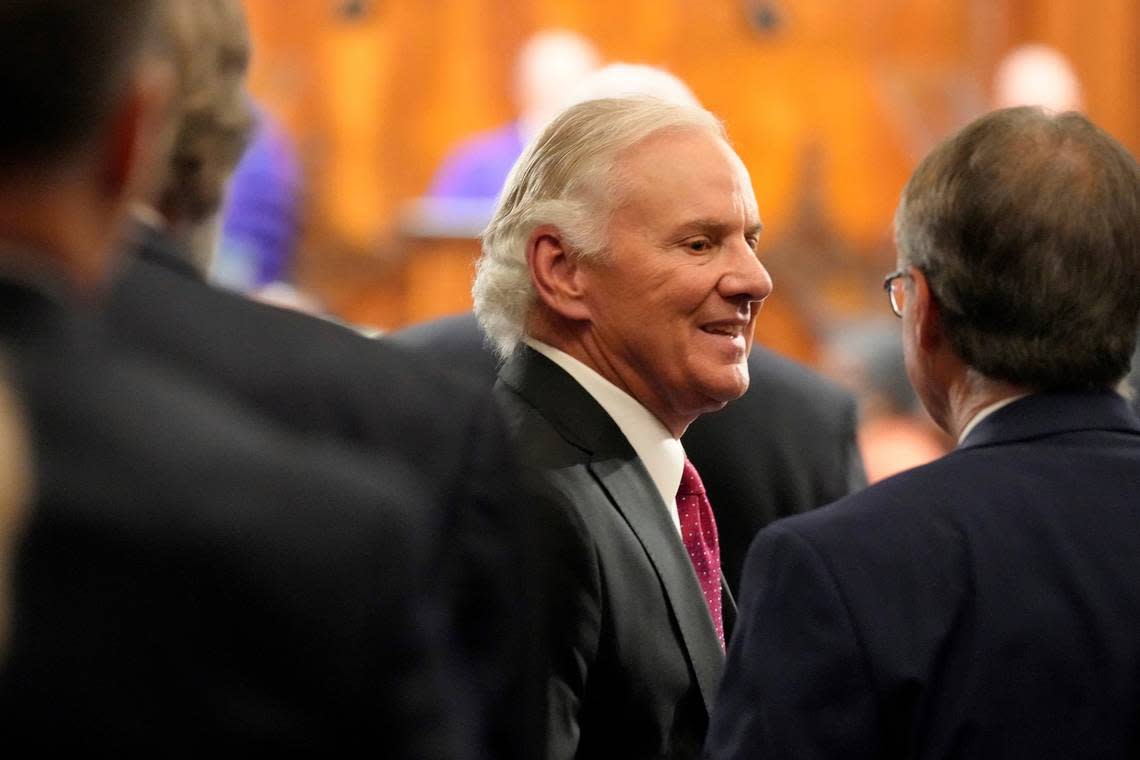
He again called for an acceleration of the state’s planned income tax cut should economic projections allow. Last year, the state lowered its highest income tax rate from 7% to 6.5%, with plans to lower it to 6% over five years, if enough money is available.
“Should an increase in future revenues allow, I ask the General Assembly to use additional funds to speed up the income tax cut schedule, so taxpayers can keep even more of their hard-earned money,” he said.
Additional infrastructure investments are needed, the governor said.
McMaster called for the state to spend $850 million to speed up completion of road projects to relieve traffic congestion on highways and interstates, repave local roads and repair more than 400 bridges in the state.
“There is no infrastructure more in need of big, bold and continued investment than our state’s roads, bridges, highways and interstates. Our successes are outrunning our infrastructure,” McMaster said.
Sabb said Democrats also wants to push investment in infrastructure.
“The governor mentioned many exciting initiatives in his address,” Sabb said. “Democrats support the plans to improve our state’s roads and bridges, expand sewer and water services and make broadband accessible to all South Carolinians.”
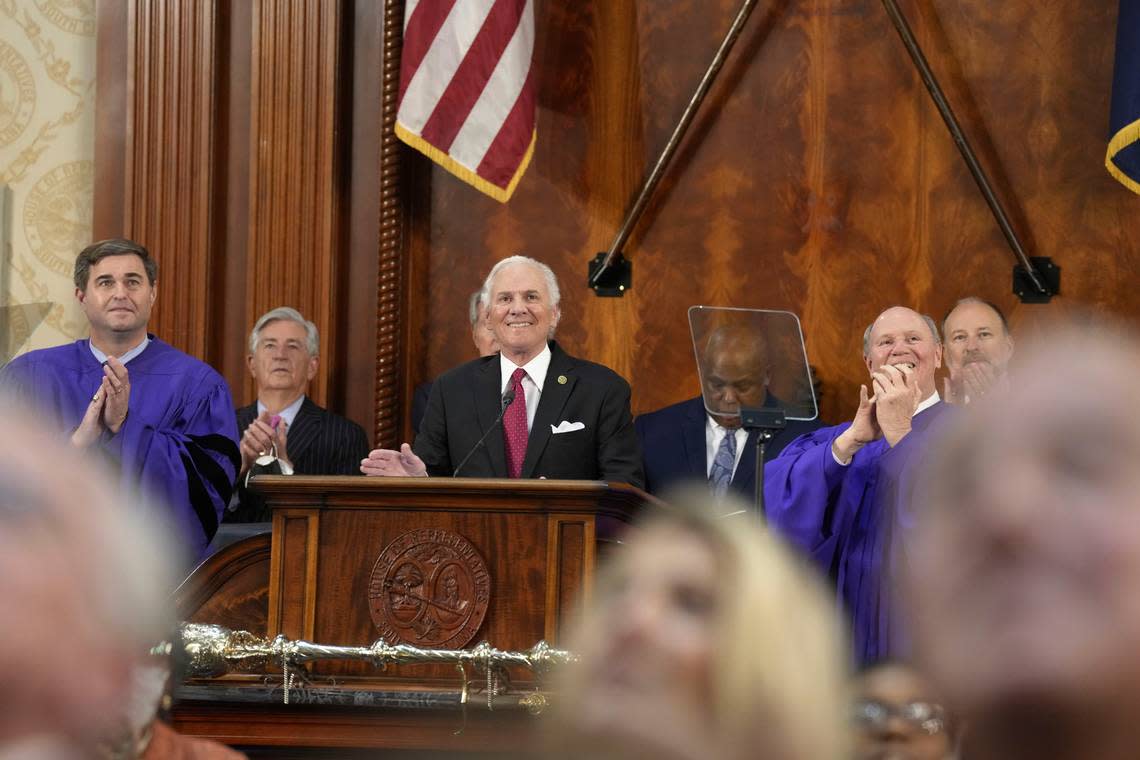
Teacher pay, mental health care
McMaster again called for higher pay for public school teachers.
In his budget proposal, McMaster wants a $2,500 raise for teachers and enough money to bring the state starting pay to $42,500, plus a $2,500 retention bonus for teachers who stay in their school districts for the year.
He has a goal of setting starting teacher pay at $50,000 by 2026, which would be his last year in office.
“We must do more,” McMaster said. “New teaching positions are being created every year at new schools constructed to keep up with our growing population.”
But Democrats said more needs to be done for schools in addition to raising teacher pay.
Sabb, who said his party has long pushed for teacher pay increases, also called attention to the physical condition of schools around the state, calling for more state money to help renovate schools, especially in rural areas.
“To ensure that students, no matter their ZIP code, have the opportunity to attend modern and safe schools, we need a recurring stream of state revenue dedicated to funding new facilities and making upgrades to outdated schools,” he said.
McMaster also called for $45 million to go to the state Department of Mental Health to recruit and retain mental health professionals, provide inpatient services and increase access to crisis services, such as suicide prevention hotlines.
“It’s clear that a mental health crisis exists in South Carolina following the COVID-19 pandemic, especially among our young people,” McMaster said. “Many are still struggling with the effects of disruptions, virtual instruction, isolation, and constant changes to normal routines.”
